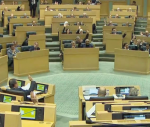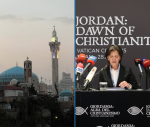You are here
No doubt world will shift to low emissions — UN climate chief
By AP - Nov 07,2016 - Last updated at Nov 07,2016
MARRAKECH, Morocco — Climate negotiators started work Monday on implementing the Paris Agreement on global warming amid uncertainty over how the US election will impact the landmark deal as temperatures and greenhouse gases soar to new heights.
UN climate chief Patricia Espinosa told delegates in the rain-soaked Moroccan city of Marrakech that "no politician or citizen, no business manager or investor" can doubt that the world is determined to shift towards a "low-emission, resilient society."
So far, 100 countries have formally joined the agreement adopted last year in Paris, including top polluters China, the United States, the European Union and India.
However, US Republican presidential candidate Donald Trump has said he would "cancel" the deal if he wins the election this week. His opponent, Hillary Clinton, backs the climate policies of President Barack Obama's government.
The upcoming election seemed to be on everyone's mind at the start of the two-week conference in Marrakech, where even security guards at the sprawling conference centre were overheard discussing the potential implications for the world and efforts to fight climate change in particular.
"Trump becoming president? I personally don't have problem with it. But what does the guy want to do?" said Adjo Bokon, a delegate from the West African nation of Togo. "Is he conscious of what is going on with climate change?"
Gabriela Fischerova, a Slovak official representing the European Union, said the 28-nation bloc is "open to any result. We will continue our discussions with any administration that will be in place".
The Paris Agreement marks the first time all countries have pledged to fight global warming by curbing the rise in greenhouse gas emissions, primarily carbon dioxide from fossil fuels.
The UN says global emissions rise every year, reaching 52.7 billion tonnes in 2014, primarily driven by the rapid expansion of China, India and other Asian economies.
Meanwhile, global average temperatures keep hitting new records. Last year was the hottest since reliable record-keeping began in the 19th century and this year is expected to be even hotter.
On a per-capita basis, rich countries like the United States, Australia and oil-rich Gulf nations, have the highest emissions.
"The wealthiest countries live as if there were three planets," said French Environment Minister Segolene Royal. Meanwhile, poor countries in Africa who have contributed very little to the problem are suffering the consequences with fertile land turning into desert, she said.
Delegates will meet for two weeks in the Moroccan city to work on the rules for implementing the Paris deal, including how to measure and report emissions so that countries can be held accountable.
The goal of the agreement is to keep the global temperature rise below 2oC compared with pre-industrial times, and "pursue efforts" to try to hold it to 1.5oC.
The lower threshold was introduced on demand from vulnerable countries such as low-lying island nations who fear they will be washed away by rising seas as global warming melts glaciers and ice sheets.
Temperatures have already risen about 1oC since the industrial revolution and analyses of the emissions cuts that countries have pledged so far show they put the world on a path to about 3oC of warming.
"Decisions made in the next few years will largely determine if we're able to achieve the 1.5oC warming threshold agreed in Paris," said Manuel Pulgar-Vidal, Peru's former environment minister who now leads environmental group WWF International's work on climate change. "Or if we take the unthinkable option of blowing right past it."
Related Articles
MARRAKECH, Morocco — The first UN climate conference after the landmark Paris Agreement closed Friday with delegates appealing to Donald Tru
AMMAN — Jordan’s delegation at the ongoing 22nd session of the Conference of the Parties (COP22) in Marrakech, Morocco, will push for fundin
AMMAN — Climate change jeopardises the survival of small- and medium-sized enterprises (SMEs), which make up 98 per cent of Jordan’s busines
















